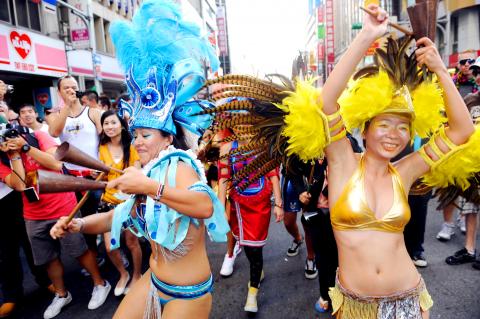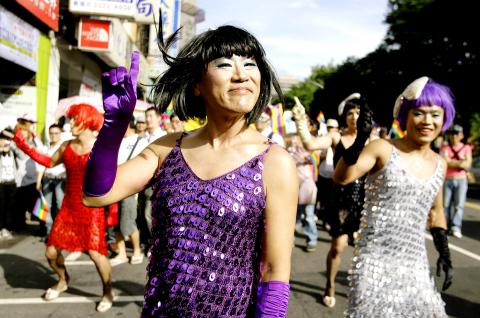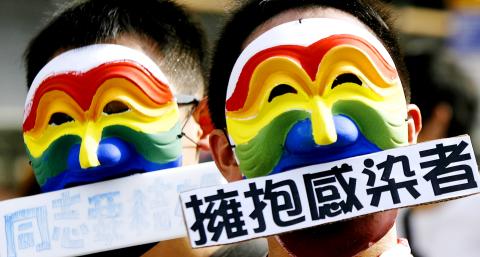With its throngs of muscled men in swim trunks and drag queens wearing flamboyant costumes, today’s Taiwan LGBT Pride parade, the largest of its kind in the Chinese-speaking world, may look like one big, boisterous party, but the message is serious.
The event is part of efforts by the nation’s lesbian, gay, bisexual and transgender (LGBT) communities — and their supporters — to raise awareness and demand basic human rights.
With this year’s theme of Out & Vote (投同志政策一票), the organizers of the event’s eighth edition are calling on supporters to come out, speak up, and demand the implementation of policies giving the country’s LGBT citizens the same rights that their heterosexual compatriots enjoy.

Photo: Taipei Times
“The gay rights movement has marched into its third decade in Taiwan. The notion that love is genderless is too superficial by now,” said Lu Hsin-chieh (呂欣潔), convener-in-chief of the march and director of policy advocacy at Taiwan Tongzhi Hotline Association (同志諮詢熱線協會). “Homosexual rights are not just about two homosexual persons being allowed to love each other, they’re also about a couple’s relation to society and where they stand in this system.”
“We want to see real policies that will benefit us,” she said.
According to Lu, policies such as the young family establishment initiative (青年成家方案) and the second-generation health insurance reform (二次健改) proposed earlier this year exclude same-sex couples, which are not included in the traditional definition of what constitutes a family.

Photo: Reuters
“The concept of ‘partner’ (伴侶) does not exist in Taiwan,” Lu said. “Taiwan’s Civil Code (民法) defines a couple as ‘a husband and a wife.’”
Taiwan’s politicians are quick to issue promises to woo voters during election time, said Lu, but have failed to pass any major law that introduces equality.
The Basic Human Rights Law (人權基本法), a bill approving same-sex marriage, was drafted during former president Chen Shui-bian’s (陳水扁) term, but never saw the light of day in the legislature.

Photo: Reuters
The Tong-Kwang Light House Presbyterian Church (同光同志長老教會), a co-organizer of the annual parade, supports gay marriage and adoption by same-sex couples.
One of the LGBT movement’s main goals is to pressure politicians into amending or repealing antiquated laws that infringe on human rights, such as Article 235 of the Criminal Code (刑法), which criminalizes the distribution, sale and public display of indecent writing, images, or other media, and Article 80 of the Social Order Maintenance Act (社會秩序維護法), which condones the sex trade but forbids advertisement for such transactions.
“Sex rights are the most basic form of human rights,” said J.J. Lai (賴正哲), the owner of Gin Gin’s Bookstore, the country’s first bookshop specializing in books, music and DVDs related to homosexual topics. “People have very diversified sexual needs. The government shouldn’t attempt to regulate our sex acts.”
This year’s theme coincides with three openly gay candidates running in Taipei City Government’s legislative elections: Wang Ping (王蘋), secretary-general of the Gender/Sexuality Rights Association in Taiwan (台灣性別人權協會); Sung Chia-lun (宋佳倫), a member of BDSM Company (皮繩愉虐邦); and Wang Chung-ming (王鐘銘), who campaigns for the rights of homosexual deaf people. All three candidates will appear on-stage at the parade to discuss their political platforms.
The parade will pass through Ximending, home of the Red House district, which after years as a dilapidated group of buildings was rejuvenated in 2004, largely because a cluster of gay bars opened there. The area, also known as Red House Rainbow Plaza (紅樓彩虹廣場), became Taiwan’s first openly gay neighborhood. However, until recently the city government’s informational materials placed in the Red House main building ignored the gay community’s presence.
In August, a petition demanding credit for the gay community’s contribution to the area’s redevelopment was launched on Facebook.
A few weeks after the Red House Comes Alive Because of Homosexuals (紅樓因同志而美麗) campaign began, more than 3,000 Facebook users had signed the petition, which was sent to the city government.
After reviewing the petition, the city government made changes in its policy to include information about the plaza in guided tours of the area.
“I’m glad about Internet users’ support of this campaign and am positive about how the city government responded to this issue,” an organizer of the online campaign told the Taipei Times, who requested anonymity because his family and employer do not know he is gay. “Taipei ranks right next to Bangkok as one of the most gay-friendly cities in Asia. We should use this rainbow resource well and try to attract more international tourists to Taipei.”
From a modest beginning of 500 participants in 2003, Taiwan LGBT Pride attracted 25,000 attendees last year. Organizers estimate 30,000 will attend this year. Previous editions of the parade have included groups from the UK, US, Malaysia, Singapore, Japan, Hong Kong and China.
This year’s parade features Mando-pop superstar Chang Hui-mei (張惠妹), better known as A-mei (阿妹), as the Rainbow Ambassador for the second year in a row. Chang will perform in the end-of-parade concert at the intersection of Gongyuan Road (公園路) and Ketagalan Boulevard (凱達格蘭大道).

March 31 to April 6 On May 13, 1950, National Taiwan University Hospital otolaryngologist Su You-peng (蘇友鵬) was summoned to the director’s office. He thought someone had complained about him practicing the violin at night, but when he entered the room, he knew something was terribly wrong. He saw several burly men who appeared to be government secret agents, and three other resident doctors: internist Hsu Chiang (許強), dermatologist Hu Pao-chen (胡寶珍) and ophthalmologist Hu Hsin-lin (胡鑫麟). They were handcuffed, herded onto two jeeps and taken to the Secrecy Bureau (保密局) for questioning. Su was still in his doctor’s robes at

A vaccine to fight dementia? It turns out there may already be one — shots that prevent painful shingles also appear to protect aging brains. A new study found shingles vaccination cut older adults’ risk of developing dementia over the next seven years by 20 percent. The research, published Wednesday in the journal Nature, is part of growing understanding about how many factors influence brain health as we age — and what we can do about it. “It’s a very robust finding,” said lead researcher Pascal Geldsetzer of Stanford University. And “women seem to benefit more,” important as they’re at higher risk of

Last week the Democratic Progressive Party (DPP) said that the budget cuts voted for by the China-aligned parties in the legislature, are intended to force the DPP to hike electricity rates. The public would then blame it for the rate hike. It’s fairly clear that the first part of that is correct. Slashing the budget of state-run Taiwan Power Co (Taipower, 台電) is a move intended to cause discontent with the DPP when electricity rates go up. Taipower’s debt, NT$422.9 billion (US$12.78 billion), is one of the numerous permanent crises created by the nation’s construction-industrial state and the developmentalist mentality it

Experts say that the devastating earthquake in Myanmar on Friday was likely the strongest to hit the country in decades, with disaster modeling suggesting thousands could be dead. Automatic assessments from the US Geological Survey (USGS) said the shallow 7.7-magnitude quake northwest of the central Myanmar city of Sagaing triggered a red alert for shaking-related fatalities and economic losses. “High casualties and extensive damage are probable and the disaster is likely widespread,” it said, locating the epicentre near the central Myanmar city of Mandalay, home to more than a million people. Myanmar’s ruling junta said on Saturday morning that the number killed had